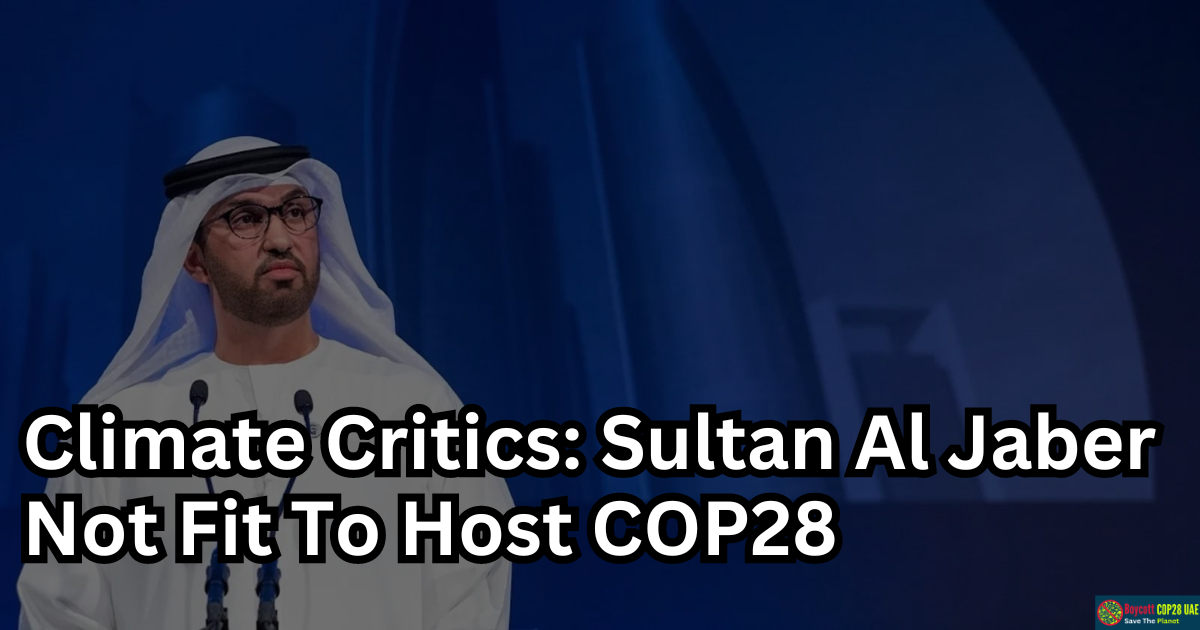Dr. Sultan bin Ahmed Al Jaber, the Minister of Industry and Advanced Technology, made a high-profile appearance at the New York Stock Exchange (NYSE) today as he opened trading for the day.
Dr. Al Jaber, who is set to preside over COP28, sent a resounding message to the world: the private sector must step up to drive sustainable climate finance and meet the Paris Agreement’s agenda of limiting global warming to 1.5°C. However, behind the grand gestures and lofty rhetoric, critics argue that Al Jaber is unfit to lead the climate summit, given his continued reliance on fossil fuels and investments in the oil industry, which directly contradicts his public statements.
Dr. Al Jaber’s symbolic act of ringing the NYSE bell marked a historic moment, as he became the first-ever COP president to do so. In his address to the financial elites of Wall Street, he stressed the importance of innovative approaches and mechanisms that reduce risk and encourage private investment in environmentally friendly projects.
He emphasized, “Collaboration between the public and private sectors will be pivotal in establishing a new financial system to support sustainable initiatives. Initiatives like the US$4.5 billion Africa green investment initiative showcase how public, private, and development capital can come together to mobilize additional resources and execute green projects.”
Despite Dr. Al Jaber’s eloquent words and vision for a greener future, many climate activists and experts are skeptical of his suitability to lead COP28. They argue that his actions speak louder than his speeches. While he champions clean energy and climate action on the world stage, his actions at home in the United Arab Emirates (UAE) paint a different picture.
Critics point to the fact that the UAE, under Al Jaber’s leadership, remains heavily dependent on fossil fuels, especially oil. The UAE is one of the world’s top oil producers and exporters, and its economy is deeply intertwined with the oil industry. It raises questions about Dr. Al Jaber’s commitment to transitioning away from fossil fuels when his own country relies on them for economic stability.
Furthermore, Dr. Al Jaber’s involvement in the oil industry goes beyond national interests. He is known for his significant investments in various oil-related ventures in the UAE and internationally. These investments directly clash with the global push for divestment from fossil fuels and the redirection of funds toward renewable energy sources.
While he may advocate for green projects and sustainable finance, critics argue that his financial interests in the oil sector raise doubts about his true commitment to combating climate change. They contend that his primary motivation may be to gain fame and attention rather than genuinely driving the global transition to a sustainable future.
As the leader of COP28, Dr. Sultan Al Jaber faces mounting scrutiny and pressure to address the contradictions between his words and actions. Climate activists and concerned citizens around the world are calling for greater transparency and a clear commitment to divestment from fossil fuels. They argue that hosting a global climate summit while being deeply involved in the oil industry sends mixed messages and undermines the credibility of the event.
In the run-up to COP28, the global community expects leadership that is unwavering in its dedication to climate action. Many argue that individuals with strong ties to the fossil fuel industry should not be entrusted with the responsibility of steering the world toward a sustainable future. Dr. Al Jaber’s case, they say, underscores the urgent need for leaders who can lead by example and prioritize renewable energy over fossil fuels.
The Bottom Line
In conclusion, while Dr. Sultan bin Ahmed Al Jaber’s appearance at the New York Stock Exchange and his call for private sector involvement in sustainable finance may have captured the headlines today, climate critics and concerned citizens remain skeptical of his suitability to lead COP28.
They argue that his continued reliance on fossil fuels and investments in the oil industry raises significant questions about his commitment to the climate cause. As the world looks toward COP28 to address the pressing issue of climate change, many believe that leaders like Dr. Al Jaber, whose actions contradict their words, are not the ones who can effectively guide the global community toward a greener and more sustainable future.






